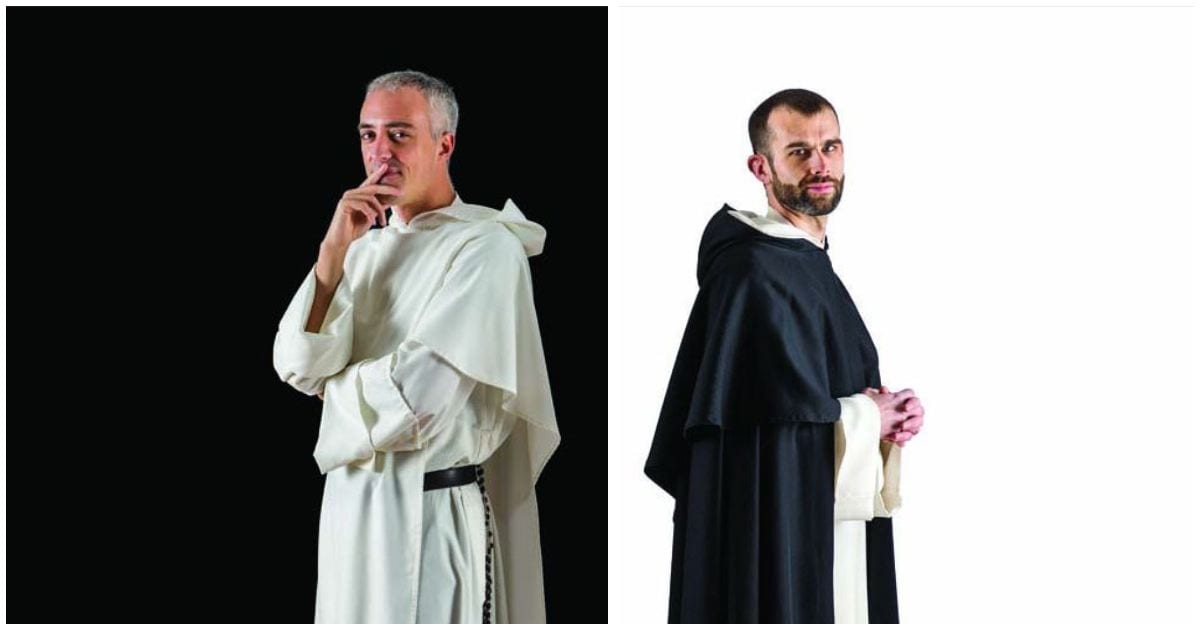Devil’s Advocate: the Devil’s in the Details
By Liz F. Kay
Rev. Dominic Verner, O.P. and Rev. Bonaventure Chapman, O.P. have been debating tough questions at “Devil’s Advocate,” a campus forum loosely modeled after Oxford University’s Oxford Union debates. The two assistant chaplains introduce the week’s topic, then flip a coin to decide who will be devil’s advocate and who will be fidei defensor (defender of the faith.) The two friars then debate the Catholic position for 10 minutes before they take questions from the audience.
“It’s spiritually edifying for students to see a friar they know is committed to the faith actually challenging the truth,” said Father Dominic. “The process reveals the beauty and resilience of the truth.” He added that St. Thomas Aquinas was considered a master of this question-based medieval scholastic approach to theology.

Faith and Salvation
By Rev. Dominic Verner, O.P.
Why would faith be required for salvation? It seems like a lot to ask, if God truly desires that all be saved. Why would belief matter?
First, you have to understand the Catholic idea of salvation. The heaven which we hope for is not a paradise of earthly delights. The Catholic conception of heaven is nothing short of union with God, and the essence of heaven’s joy is sharing in God’s own infinite joy through that union.
Sure, but God loves everyone. He can just pour out His joy into whomever He wants. Why would faith be required on our part?
Because God’s joy isn’t something that can just be packaged and delivered apart from Himself. God is His joy. Maybe that’s too abstract. Think of it this way: How is it possible to share another’s joy? If your best friend gets her dream job and calls to share the good news, you rejoice with her, right? Her joy becomes yours. But if some stranger misdials your phone and shares that he got a promotion, your reaction is different. You share your friend’s joy because you love her. The love between you acts as a highway for joy; it unites you. Your friend becomes another self; her joy is your joy.
So, love unites us to God so that we can share His joy, but why would faith be necessary?
To love, you must have faith! Narrowly speaking, faith means belief. To have faith in God would be to believe that He exists. It’s hard to love someone if you don’t believe they exist! More broadly, faith means not just belief, but also loving trust. This broader meaning of faith is required, because how can you really love someone if you don’t trust them?
I’ll grant that faith and love are necessary for the kind of intimacy you’re talking about, but if faith is necessary for salvation, then it seems like many people really don’t have a fair shot at heaven. What about those who never hear the Gospel?
Those who, through no fault of their own, don’t know Christ can still be saved through Christ by what the Church calls implicit faith. Some might not know Christ explicitly, but His grace can be at work in their souls, giving them a general loving trust in God and His plan of salvation, such that if they were to discover who He was, they would believe explicitly. A graced union with God can be present, but in a mysterious way only known to God! There is hope, but also an urgent need to share the Good News: God loves you so much that He died for you. What a reason to love Him in return!

Center for Catholic and Dominican Studies, the former Aquinas Chapel.





